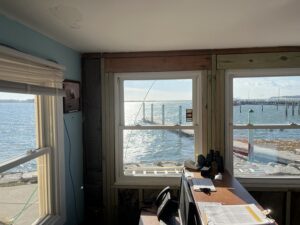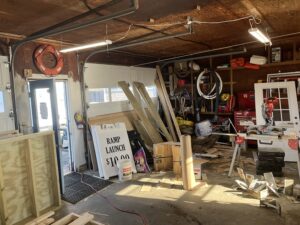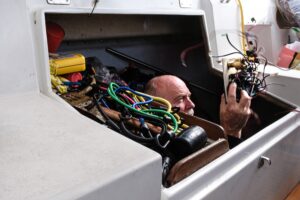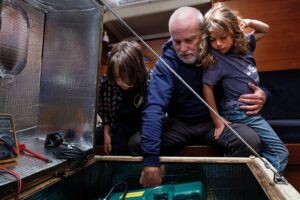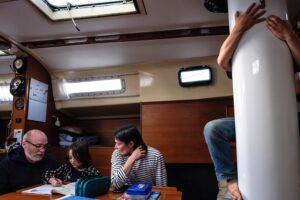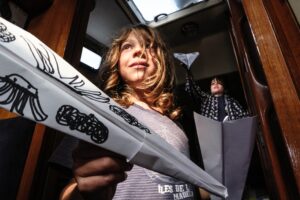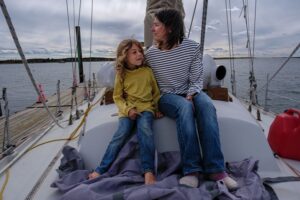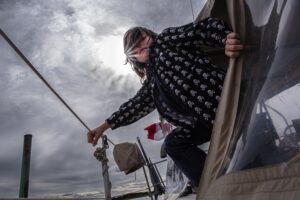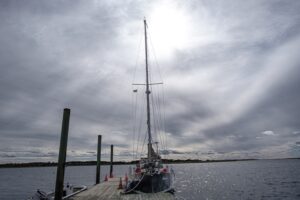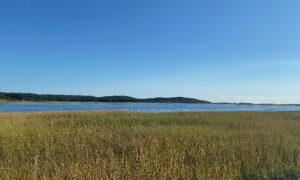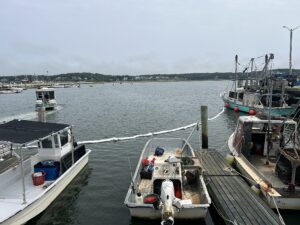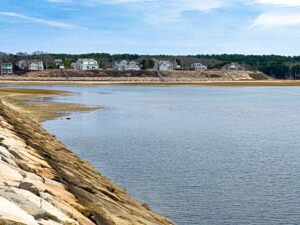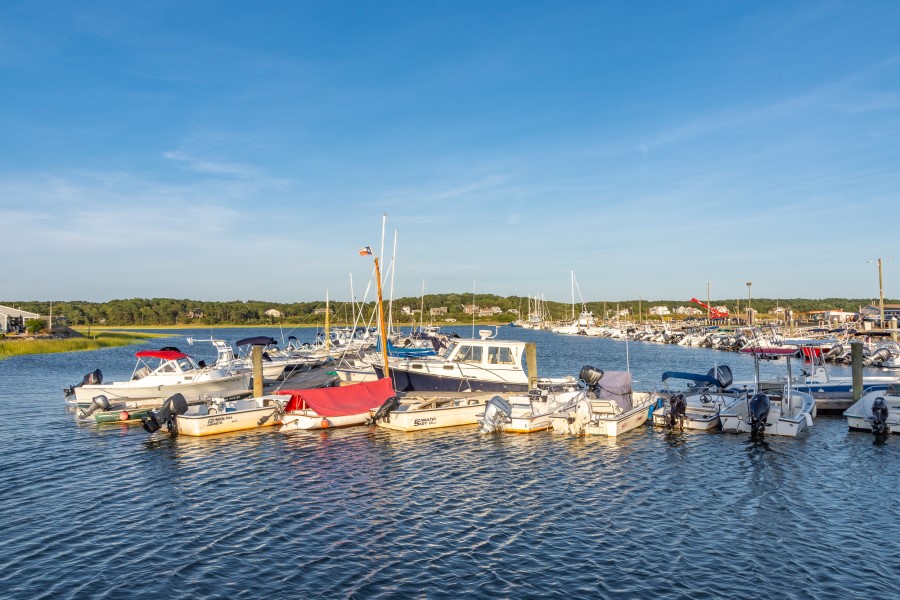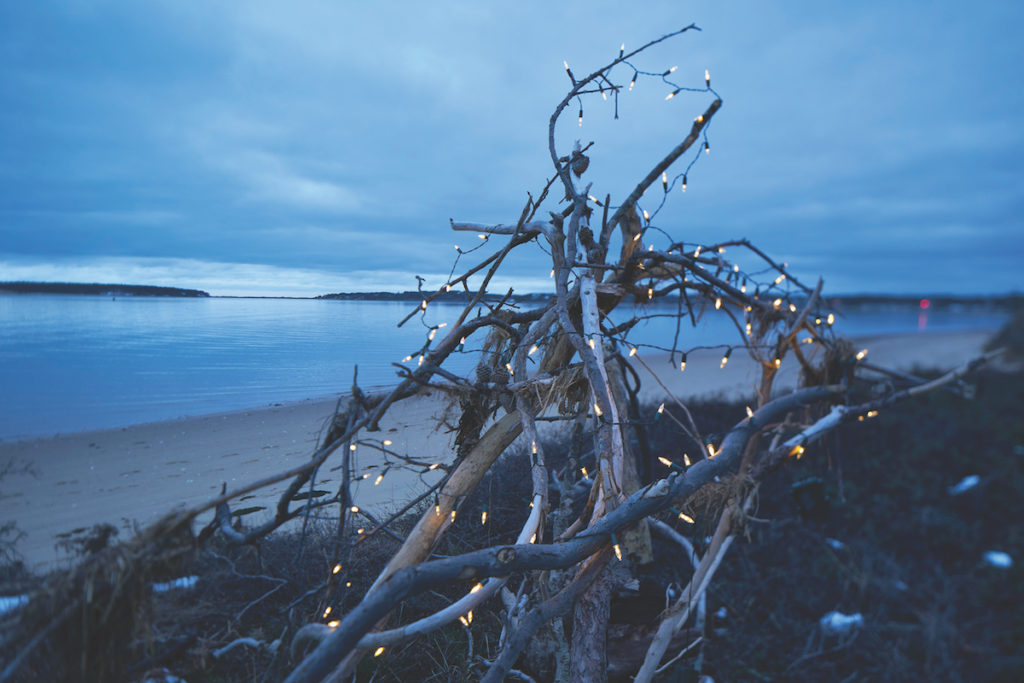WELLFLEET — A menace stalks the shores of Wellfleet in the thousands: the European green crab, Carcinus maenas, an invasive species that feasts on juvenile shellfish and clips eelgrass to a nub.
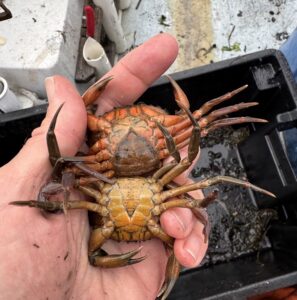
Green crabs represent a different threat to saltmarsh habitats than that of Sesarma crabs, also known as purple marsh crabs, that feast primarily on Spartina reed grasses in marshes including the one in Provincetown’s West End, as the Independent has reported.
The green crabs burrow underground to dig up clams and disturb soil and sand in the process. Two studies suggest that small oysters that are growing on shellfish grants but still too small to harvest are especially vulnerable to green crab predation.
Local efforts to control their population have been scant, says Wellfleet Shellfish Constable Nancy Civetta — until now.
Wellfleet shellfisherman Dave Seitler and Owen Nichols, director of marine fisheries research at the Center for Coastal Studies, have launched a 16-week experimental project to harvest green crabs in the harbor by collecting them in traps placed at locations including the railway bridge, Blackfish Creek, and Chipman’s Cove. The two began the harvest on May 15 and are using 35 baited shrimp traps — modified with smaller entryways to avoid entangling terrapin turtles — to catch the crustaceans.
Seitler received a $5,000 grant from the Wellfleet Oyster Alliance to buy the modified traps in March from a lobsterman in Nobleboro, Maine. Each trap is marked with a white buoy, and Seitler checks them once a week. Then, he and Nichols count and weigh what the traps have collected before performing a closer species analysis.
“We’re looking at the sex ratio — whether we’re catching more males or females — what size the crabs are, what condition they’re in,” Nichols said. They are also recording whether and when the female specimens carry eggs. That’s because “if you want fewer crabs, you might want to harvest them during a time when they’re reproducing,” Nichols said.
When Seitler brought up his project at a brainstorming meeting on how to mitigate crab predation, it was welcome news to her department, Civetta said. She added that she hoped getting the crabs out of the estuaries would do more than benefit the wild oyster population by also helping the salt marsh survive.
The shellfish dept. already has an eight-trap crab study underway in Chipman’s Cove, according to Johnny “Clam” Mankevetch, Wellfleet’s assistant shellfish constable. But Seitler and Nichols’s initiative represents a major step forward for crab control, expanding that study to 35 traps placed harbor-wide. “We should have done this a long time ago,” Mankevetch told the Independent.
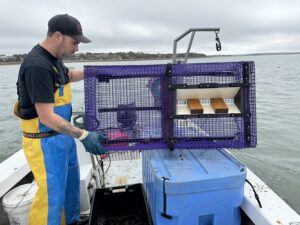
Mankevetch estimated that the crabs’ population began to surge locally at least 30 years ago. He attributed their rise to a lack of natural predators and warmer winters allowing for longer breeding periods. Reviewing three population studies conducted elsewhere, biologists Alan Young of Salem State University and James Elliott at New England Biolabs reported in Fishes in 2019 that crab populations decline after colder-than-normal winters.
Detailed local data on the species has been missing in part because the harbor has not undergone a comprehensive ecological survey since 1972, said Civetta. But anecdotal evidence suggests a crab conquest is underway. Mankevetch said he set eight baited eel traps from last July through September to observe the catch in Chipman’s Cove, the town’s premier site for oyster spawning. The result over two months, he said, was more than 17,000 green crabs caught — and only two eels.
He found that outcome “abysmal.”
“Estuaries are supposed to be very productive ecosystems,” said Mankevetch, adding that he recalled traps he set in his youth yielding a wide variety of crabs, fish, and eels. “We should be seeing a lot more species diversity than we’re seeing.”
The idea for the grant proposal, Seitler said, came after reading about the crab invasion over the past half decade and observing the shellfish dept.’s early efforts to control them. “I just thought that I could do it on a larger scale and maybe help to start a bounty program to catch them, like Ipswich and Gloucester,” he said.
Those municipalities, along with Essex, Rowley, and Newbury, launched a trapping program in the Great Marsh in 2015, paying harvesters 40 cents per pound for their green crab catch. Fishermen participating in the North Shore initiative — which is partially funded by the town of Ipswich and the Mass. Div. of Marine Fisheries — have been removing over 100,000 pounds of green crabs a year from salt marshes, project coordinator Peter Phippen told the Independent.
State Rep. Hadley Luddy accompanied the shellfish dept. on patrol to see the scale of the problem in April, Civetta said. Afterward, Luddy secured an earmark of $25,000 in the House draft of the state fiscal 2026 budget for a “green crab task force” to mitigate the populations on Cape Cod, she told the Independent.
The earmark was included in the final House budget proposal and is now being considered by legislators in conference committee, said Sen. Julian Cyr.
Each week, Mankevetch collects the department’s traps, some of which are marked by nothing beyond an empty laundry detergent bottle. “I would never waste a good buoy on green crabs,” he said. On one recent trip on the department’s skiff, he rebaited them with waste from Hatch’s Fish Market — “Like Valhalla!” Mankevetch said. “I don’t mind making the last meal their best meal.
“Look at those claws,” Mankevetch said, showing off dozens of crabs in a trap. “Can you see the nightmare?”
To Bait, Compost, and Serve
Bounty or not, Civetta said harvesters need to dispose of the living crabs properly after removing them from the ecosystem. The point, she said, is not “killing them for killing’s sake.” Instead, she said that with a commercial permit, wild harvesters can join the bait fishery and sell green crabs as bait.
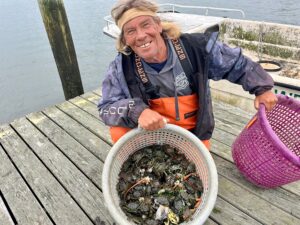
The department has also considered, with the Barnstable County government and neighboring towns, whether a compact composting system could be funded with the state’s earmark. For now, Civetta said, the department has permission from the Wellfleet Shellfish Co. to bring crabs to its Eastham location for composting.
Seitler and Nichols’s initiative also proposed composting the crab shells, which are rich in calcium and nitrogen and could be used to help grow vegetables. Seitler is testing that idea by composting crabs in his yard, with plans to try out the results in his garden.
After securing a harvest permit for the species, Seitler gave four pounds of live crabs to the chefs at Mac’s Shack in May “just to play around with.”
Mac’s executive chef, Scott Robertson, told the Independent that green crabs don’t have much potential as a soft-shell special because they are smaller than Jonah crabs and blue crabs and not very meaty. “But they have a ton of flavor,” he said.
He simmered the experimental catch with aromatics before smashing the shells and straining off a stock similar to the one he usually makes from lobster heads. He paired the broth with a risotto under torn Jonah crab meat and a local grilled monkfish. “It was delicious,” he said.
On May 31, Robertson put the special on the menu at the Shack. He reported that they sold more than 30 orders.
